BDUK Corporate Plan 2024 to 2025
Published 10 April 2024
Our mission: To ensure that homes and businesses across the UK can access fast and reliable digital connectivity.
1. Foreword - Chief Executive Officer and Chair of Building Digital UK
At the start of 2024, the UK hit a major connectivity milestone, with over 80% of premises gaining access to a lightning-fast gigabit broadband connection. That figure grows by the month - the UK is currently building gigabit networks faster than any EU country - and it’s incredible to think that just five years ago gigabit coverage stood at just 6%. It demonstrates what can be achieved through great collaboration between the government and the telecoms industry.
Building Digital UK (BDUK) also reached a monumental milestone this year. Through various government-funded programmes, we have now delivered gigabit broadband to over one million homes, business and public sector buildings. From hamlets surrounding Land’s End in Cornwall to a Royal Air Force radar station in the northern isles of Shetland. All of these were previously suffering from slow and unreliable broadband, and have been transformed by improved connectivity.
In February, the Secretary of State for the Department for Science, Innovation and Technology (DSIT), Michelle Donelan, visited the beautiful Northumbrian town of Wooler to see first hand the positive impact gigabit connectivity has made to the local community. She met local residents who talked about their new ability to work from home without any buffering, and heard from small business owners who’ve seen new ventures thrive. There are similar stories in villages and towns across the country, but we know there are many places that we’ve yet to reach. It’s hard to underestimate the difference that digital connectivity makes, the opportunities it unlocks and the benefits it enables. Every community we reach only serves to underline how important it is that we deliver the government’s mission for nationwide gigabit coverage by 2030.
We have made great strides connecting many hard-to-reach parts of the UK, working with a dynamic range of suppliers of all sizes. Our programmes have helped to grow the rural economy, create jobs and ensure those in rural communities across the country can reap the rewards of lightning-fast connectivity. The rollout of Project Gigabit will now extend this further. We have put in place the building blocks for this future delivery: we have signed over £1 billion in contracts to connect a further 780,000 premises, and more are in the pipeline, covering all four corners of the UK. As Project Gigabit’s delivery gathers pace, we will see more premises connected, more communities benefiting and local economies growing.
But digital connectivity is not just about a fixed broadband connection. A reliable phone signal is no longer just a ‘nice to have’ in today’s world; it is essential for accessing work, services and opportunities.
In March 2024, we announced the first masts in Wales that have been activated thanks to government investment through the Shared Rural Network (SRN). Here, we are taking existing infrastructure, used to deliver the Emergency Services Network, and upgrading masts so that they provide 4G coverage to areas where previously it was impossible to get a signal.
More broadly, we are supporting the four mobile network operators to tackle so-called ‘not spots’ - areas with little or no 4G mobile coverage - which can frustrate and hinder people’s opportunities to connect on-the-go from some of the UK’s most remote regions. Since the Shared Rural Network was signed in 2020, parts of the country totalling over 2,000 square miles – equivalent in size to the counties of Cheshire and Lancashire combined – that were previously without 4G are now covered by at least one operator. Also, areas totalling almost 5,000 square miles of ‘not spots’ - or 60% the size of Wales - now have coverage from all four operators. This improved connectivity enables people to work on the move, it opens up new opportunities for innovation and tech in farming, helps tackle rural crime, and makes it easier for first responders to reach people in need of assistance through enabling 4G to facilitate 999 calls for the first time.
In Project Gigabit and the Shared Rural Network, we are driving forward two game-changing programmes that will supercharge the UK’s digital infrastructure. As we look ahead to next year, we can expect the delivery of our programmes to ramp up. Connecting increasingly harder to reach communities will present new and complex challenges. We will need to harness all the talent and expertise that exists across the teams that make up BDUK.
Most importantly, to write this next chapter of connectivity - not just today but for decades to come - we will need to continue to work collaboratively with our partners, local councils, devolved administrations and the private sector. Our shared motivation, to transform people’s lives through better connectivity, will drive us forward and we look forward to continued success in the next 12 months.
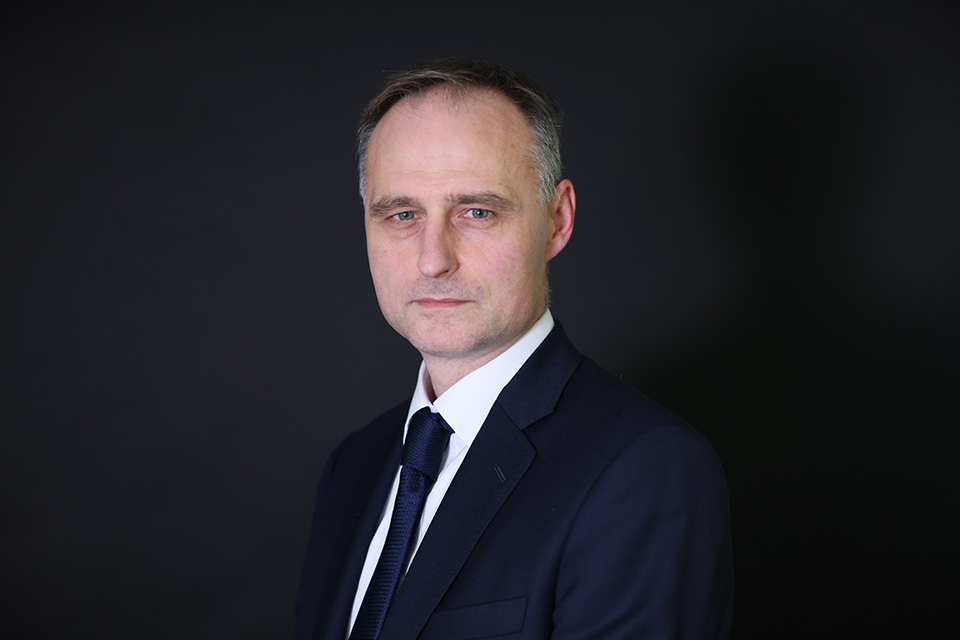
Dean Creamer CBE
BDUK Chief Executive Officer
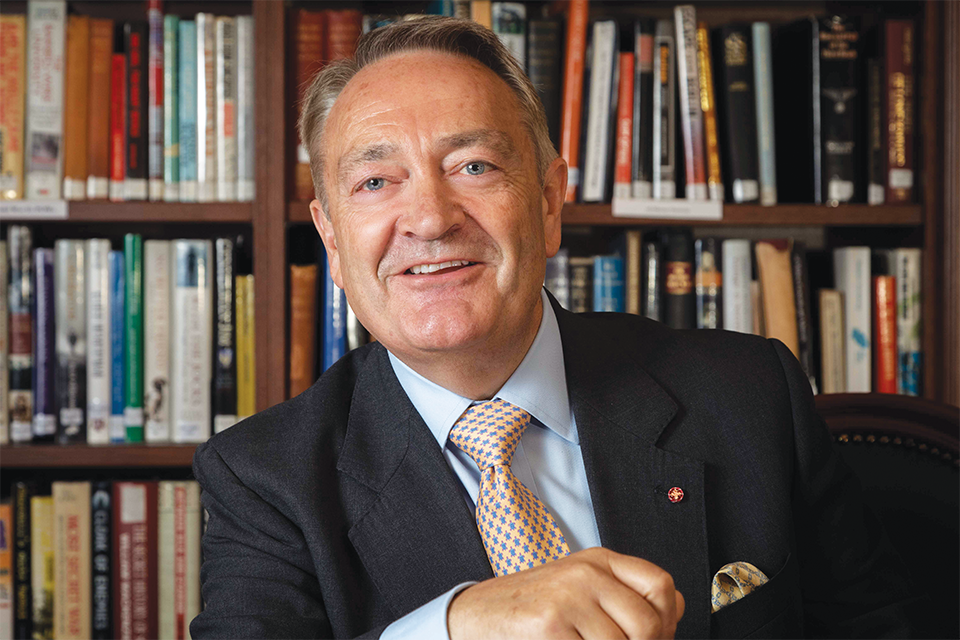
Simon P. Blagden CBE
BDUK Chair
“In Project Gigabit and the Shared Rural Network, we are driving forward two game-changing programmes that will supercharge the UK’s digital infrastructure.”
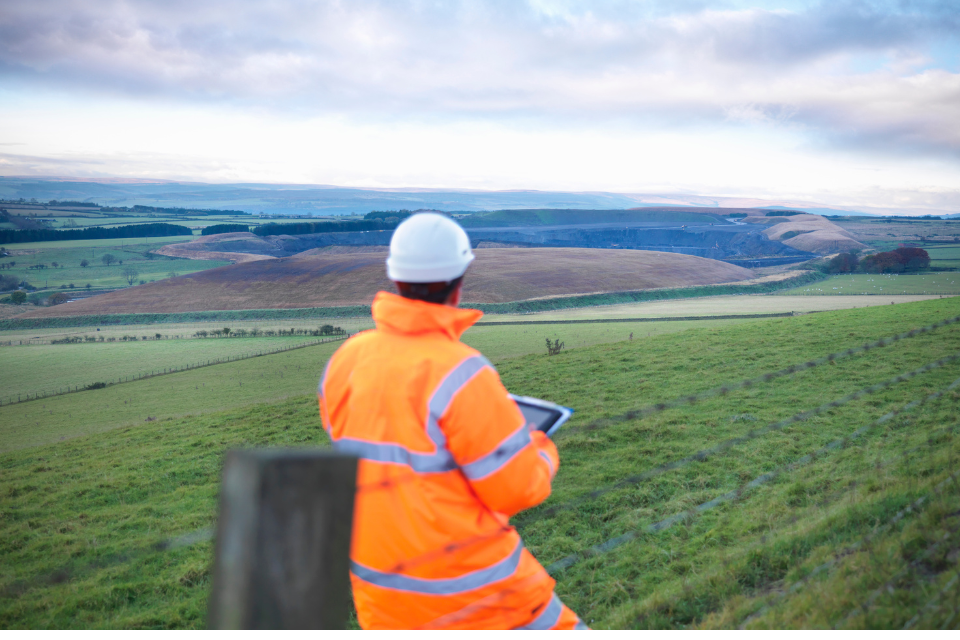
2. Who we are
BDUK is an executive agency of the Department for Science, Innovation and Technology (DSIT), with a mission to ensure that homes and businesses across the UK can access fast and reliable digital connectivity.
We are a specialist delivery agency responsible for the rollout of gigabit-capable broadband and the expansion of mobile coverage through two flagship programmes: Project Gigabit and the Shared Rural Network. Delivering our mission is a team effort across government, industry, local councils, devolved administrations, regulators, consumer groups and citizens, and we work with these partners to ensure that people can access the reliable digital connectivity that can transform their lives. The fast, reliable connections delivered by our programmes will:
-
Create and support thousands of high-paid, high-skilled jobs. The digital connectivity we are delivering will give people greater flexibility to work from any location, increasing employment opportunities in rural and remote locations, and promoting greater digital innovation.
-
Provide people with greater access to online services. People from remote areas will have access to more services including remote GP appointments, training and local government services.
-
Enhance people’s home life. Improved digital infrastructure will enable the use of more internet-connected smart appliances, higher quality streaming, and faster and more reliable connectivity.
-
Enable more people to stay connected on-the-go. Improved mobile coverage allows people to use digital maps, stream content and make calls when moving through remote locations throughout the country.
The Chief Executive Officer (CEO) is both the Accounting Officer and the Senior Responsible Owner for our programmes. The CEO is held to account by the Secretary of State, Minister of State, and DSIT’s Principal Accounting Officer. The CEO is also advised and challenged on strategy, delivery and risk management by BDUK’s Board.
To achieve our goals, our work is underpinned by four core values: Embracing Challenges, Delivering Excellence, Working Together and Respecting Differences.
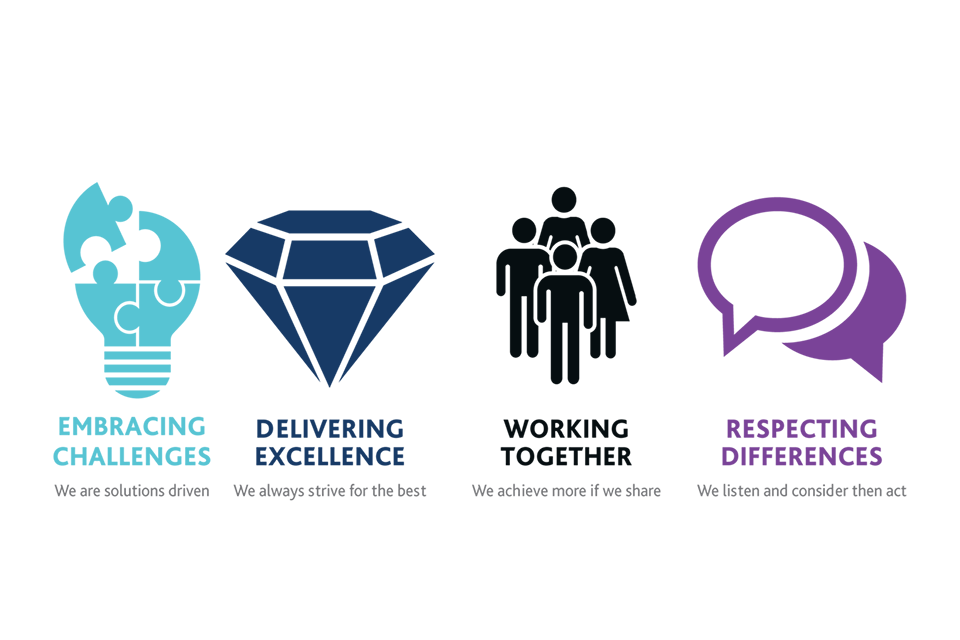
We published our multi-year Corporate Plan 2023 to 2026 in July 2023. It sets out in detail who we are, what we do and our objectives spanning the three year period to March 2026. Please refer to the Corporate Plan 2023 to 2026 for further detail describing our activities. This Corporate Plan 2024 to 2025 avoids reproducing this information. It acts as a companion document that focuses on our objectives in the year ending 31 March 2025 and highlights notable developments since the last plan was published.

3. Delivering our mission: Project Gigabit
Project Gigabit is a £5 billion programme to deliver gigabit-capable broadband to homes and businesses across the UK that would otherwise not get connected through suppliers’ commercial rollout plans. The programme will support the government’s target to ensure nationwide gigabit-capable broadband by 2030, making sure that people have the same access to fast and reliable connectivity wherever they live, work and study.
Project Gigabit was launched in March 2021, building on successful previous programmes including the Superfast and Rural Gigabit Connectivity programmes.
As a result of significant commercial and subsidised delivery, over 81% of UK homes and businesses can now access a gigabit-capable broadband connection [footnote 1]. This is up from just 6% in early 2019, and demonstrates the strong progress made towards the government’s target of at least 85% coverage by the end of 2025, and then to nationwide gigabit-capable broadband by 2030.
3.1 Our interventions
Project Gigabit has four interventions, each designed to deliver gigabit-capable connectivity to premises outside of suppliers’ commercial build plans.
Delivery in detail: Project Gigabit’s four interventions
-
Gigabit contracts - contracts with suppliers to extend their plans to build gigabit-capable infrastructure to premises that will not be reached by their commercial plans alone. This support ranges from smaller local contracts (aimed at reaching up to 15,000 premises), to larger regional contracts (up to 100,000 premises) and cross-regional contracts (up to 500,000 premises).
-
Superfast contracts - projects under the Superfast Broadband Programme that have been reconfigured to deliver gigabit-capable connectivity. Extra funding from Project Gigabit is being used to extend existing contracts to deliver additional gigabit infrastructure.
-
Gigabit Broadband Voucher Scheme - vouchers worth up to £4,500 for both residential and commercial premises, which can be claimed by anyone in eligible rural areas to cover the costs of a supplier extending their network to their premises.
-
GigaHubs - grants to connect vital local public services, typically schools, libraries and GP surgeries, in hard-to-reach areas. We are not actively developing new projects given the coverage now being provided through other mechanisms.
3.2 Our progress so far
In February 2024, we announced that the government had subsidised gigabit-capable connectivity to more than one million premises. [footnote 2] The majority of these, totalling 746,500 premises, were given access to gigabit-capable broadband through the Superfast programme. Voucher projects contributed 250,800 premises, with a few also getting a connection as a result of our GigaHubs projects and first Gigabit contracts delivery. [footnote 3]
In our Annual Report and Accounts 2022 to 2023 we reported that in total 79% of our delivery has been directed at sub-superfast premises. As over 97% of homes and businesses have access to superfast speeds, this means that we are overwhelmingly targeting premises with some of the slowest connections in the country.
Last year our Gigabit contracts began delivery in earnest. Over £1.3 billion has been committed in signed contracts, which will deliver fast, reliable broadband to up to 780,000 homes and businesses that would otherwise be left behind. [footnote 4] These contracts form the cornerstone of our interventions to reach premises that will not gain coverage through commercial delivery alone.
3.3 Delivery in detail: Collaborating with suppliers
Our relationship with suppliers is critical to the success of Project Gigabit. The commercial market has planned nearly £44 billion of investment into UK full fibre by 2030. [footnote 5] Suppliers’ commercial rollout has reached significantly more premises than expected, and combined with subsidised build, over 81% of homes and businesses already have access to a gigabit-capable connection. [footnote 6] Our commitment of £5 billion over the life of the programme will help enable them to deliver even further and faster.
Gigabit-capable premises passed by supplier [footnote 7]
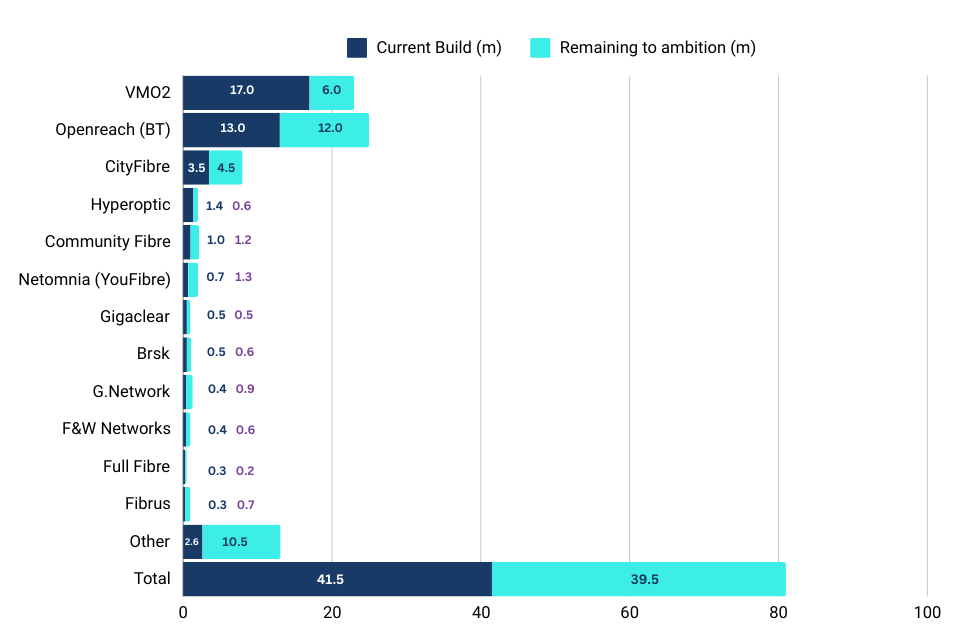
BDUK provides the subsidies, but it is the suppliers who are responsible for building the network. These suppliers are making good progress. For example, in December 2023, GoFibre announced the completion of their first phase of build under our £7.3m North Northumberland contract, bringing gigabit-capable coverage to over 1,100 hard-to-reach homes and businesses.
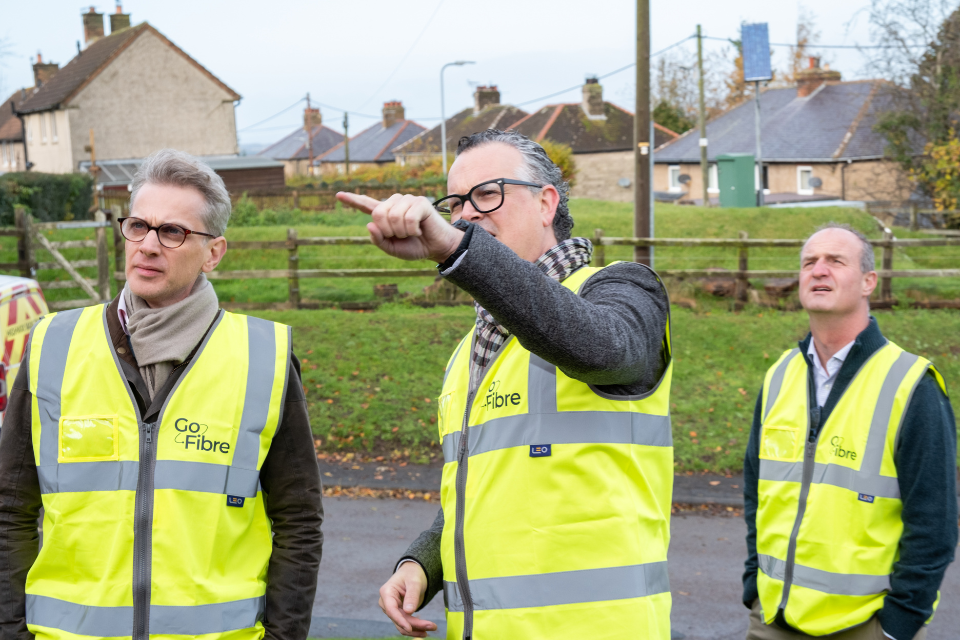
What our suppliers say:
“Our strong relationship with BDUK allows us to work together to solve problems, improve processes and, ultimately, deliver world-class connectivity to as many hard-to-reach communities as possible. BDUK’s open and transparent approach has helped to develop trust and integrated working practices between our teams. We look forward to working closely together over the years to come, to ensure the country’s digital infrastructure is fit for the data age.”
Greg Mesch
Chief Executive Officer, CityFibre
“Gigaclear has worked with BDUK continuously since 2015 and we have developed a valuable and productive relationship through our engagements with their programmes. Gigaclear and BDUK are both aligned on the need to maximise gigabit coverage in underserved rural areas.”
Nathan Rundle
Chief Executive Officer, Gigaclear Ltd
“Lothian Broadband Networks has been working with BDUK for over two years, identifying suitable Gigabit Voucher projects throughout Scotland. BDUK’s positive, proactive engagement has allowed us to provide tens of thousands of homes with access to a gigabit-capable network in some of the most underserved areas of the UK. Prior to our network rollout in the Highlands only 0.14% of homes within the project area had access to a gigabit-capable network; now nearly 20,000 homes in this area have access to an 10Gbs FTTP fibre network. With BDUK’s support we can continue to close the digital divide throughout many more areas of rural Scotland.”
Gavin Rodgers
Chief Executive Officer, Lothian Broadband Networks
In March 2023, the National Infrastructure Commission published a progress review providing the government with impartial, expert advice on major long term infrastructure challenges.[footnote 8] The review noted that the government continues to make good progress on supporting deployment of new digital infrastructure networks and delivery of full fibre and gigabit-capable broadband is progressing rapidly. Significantly, if suppliers deliver on their published plans, and the government maintains the £5 billion subsidy programme for underserved areas, the government will likely achieve its target to deliver nationwide coverage by 2030. The commission’s most recent assessment report, published in October 2023, continued to highlight the importance of gigabit-capable and mobile infrastructure in improving the UK’s economy.[footnote 9]
3.4 Our future progress
With the vast majority of our procurements launched and many areas under contract, we are now focused on ensuring that suppliers deliver the connectivity required. We also continue to review the plans for each region to extend contract coverage where we can, or to re-open the voucher scheme in local areas. We expect to sign the cross-regional contract framework early this year and will undertake further call-off procurements to cover remaining areas that have not been covered through other procurement options.
The digital infrastructure market remains dynamic, affected by the same macroeconomic headwinds as found across other infrastructure sectors. We are also mindful of further sector-specific risks where fragmentation in the market and overbuild in the network may lead to lower take-up by consumers. We are continuing to monitor commercial coverage plans and will respond wherever possible to fill gaps in coverage in areas where there is retrenchment. We are prepared to respond in any instances of supplier financial distress events and, alongside DSIT, we have prepared for a range of possibilities. We will continue to work closely with our partners across government, Ofcom and industry to put ourselves in the best position to deliver on our shared, ambitious objectives.
A small number of premises are outside the scope of Project Gigabit, due to the difficulty in suppliers reaching them with gigabit-capable connectivity while maintaining good value for money. The government consulted on improving broadband for Very Hard to Reach premises at the end of 2023 and is considering responses.
3.5 Supporting the government’s coverage targets
We have made significant progress, already reaching 81% coverage by March 2024. Government intervention has stimulated competition in the market and commercial build has gone faster and further than expected. While the government still expects the UK to reach 85% gigabit capability by December 2025, some independent analysis suggests we may achieve this target earlier.[footnote 10] As a result of the increased commercial coverage, there are fewer premises which require public subsidy and those that do are generally harder to reach – which has a direct impact on Project Gigabit.
Our target trajectory below supports achievement of 85% gigabit coverage by 2025, a critical milestone on the path towards nationwide coverage by 2030. Our Gigabit contracts and voucher projects provide the building blocks for completing this delivery. The target trajectory has been updated to account for this improved commercial coverage and other factors affecting delivery. These include delays in contract signing and mobilisation, as well as more premises being placed into our cross-regional framework which is currently in procurement.
The target trajectory also takes into account some of the risks now facing every major infrastructure project, brought on from a challenging economic environment for our suppliers. These include the increased cost of capital, reduced availability of commercial funding, and inflationary pressures, all of which may increase the risks of delivery in non-commercial areas, even with government subsidy. To reflect this increased uncertainty, the target trajectory is presented as a range representing the potential scale of impacts on our future delivery.
The trajectory below shows that BDUK expects to have passed between 1.1 and 1.2 million premises by the end of March 2025, with overall gigabit-capable coverage likely meeting the government’s 85% interim target by then.
Table 1: Updated target trajectory
| Up to March 2023 | By March 2024 | By March 2025 | By December 2025 | |
|---|---|---|---|---|
| Cumulative premises passed by BDUK interventions | 935,000 | 1,000,000 to 1,050,000 | 1,100,000 to 1,200,000 | 1,340,000 to 1,560,000 |
| Total per cent premises passed (includes both commercial and subsidised delivery) | 75% | 81% | 85% | 85%+ |
Notes:
-
The target trajectory shows the number of premises BDUK estimates it will need to pass with its subsidies in alignment with the government’s 85% gigabit-capable target. It is not an official forecast.
-
The cumulative premises passed figure up to March 2023 has been updated from our previous Corporate Plan to reflect actual delivery.
-
Total per cent premises passed (includes both commercial and subsidised delivery): This is the total percentage of UK premises that must be passed by our own interventions and the wider market’s commercial plans to meet the government’s 85% coverage target.

4. Delivering our mission: Shared Rural Network
The Shared Rural Network programme will level up mobile coverage in rural areas across the UK through a £1 billion deal with the four mobile network operators (MNOs) - EE, Three, VMO2 and Vodafone - delivering 4G coverage to some of the hardest to reach parts of the country. It will tackle the digital divide between urban and rural areas, supports economic growth and contributes to public safety, bringing improved 4G connectivity over a wider area to first responders and facilitating 999 calls for the first time. The programme also has specific coverage targets for an extra 280,000 premises and 16,000km of roads.
This programme will see MNOs collectively increase 4G mobile phone coverage throughout the UK, so 95% of the UK geography will have coverage from at least one mobile network operator by the end of 2025, and further coverage improvements in more hard-to-reach areas will continue to be delivered until the start of 2027. The programme will lead to increases in coverage across all four nations, with the biggest coverage improvements in rural parts of Scotland, which currently has the lowest 4G coverage of any of the four Nations.
All the work undertaken by the MNOs as part of the programme is regulated by Ofcom, with regular reporting throughout its life to ensure agreed obligations and targets are met.
The below outlines the key phases in the delivery of the programme.
Delivery in detail: the SRN rollout phases
The programme is delivered in two parts:
- Phase one - The four MNOs are collectively investing over £532 million in a shared network of new and existing phone masts. This will help tackle Partial Not Spots, which are areas where there is currently coverage from at least one, but not all, mobile operators. The MNOs have a target in their licence obligations to complete this element of the programme by June 2024.
- Phase two - The government is investing over £500 million to go even further to significantly reduce Total Not Spots, which are areas where there is currently no coverage from any mobile operator. As part of this government-funded element of the programme, there will be upgrades to Extended Area Service masts being built as part of the Home Office’s Emergency Services Network.[footnote 11] This will make these masts usable by the four MNOs. This element of the programme is to be completed by January 2027 to meet licence obligations.
4.1 Our progress so far
We have worked with our partners to improve 4G coverage in rural areas throughout the country. 4G coverage across the UK has now reached 93%, an increase from 91% in March 2020 when the SRN agreement was signed.[footnote 12]
Progress on the Total Not Spots element of the programme has been focussed on site surveying, site applications and planning - laying the groundwork for future build of masts on suitable sites. Digital Mobile Spectrum Limited (DMSL) coordinates the Total Not Spots element on behalf of the MNOs and continues to advance the required procurements which will underpin this.[footnote 13] The process of enabling sharing of the Home Office Emergency Services Network’s Extended Area Service (EAS) masts is also progressing. The first fully activated 4G government funded site in Lockerbie went live in April 2023. In March 2024, we announced the first site in rural Wales in Powys County going live, with further masts set to be switched on in the coming months. We are committed to supporting our delivery partners to acquire and activate more sites in the year ahead, and to pay the MNOs’ grant funding claims efficiently to maximise delivery success. These steps will help provide the coverage that the programme aims to provide to residents and visitors in hard-to-reach rural areas.
In February 2024, the National Audit Office (NAO) published a report on supporting mobile connectivity; we acknowledge its findings and will continue to work with mobile network operators to ensure the programme is delivered on time and that the crucial coverage improvements are delivered across rural parts of the country.[footnote 14]
4.2 Our future progress
We will continue to support our delivery partners to move further into the acquisition and build of masts, setting out specific targets in our objectives for 2024 to 2025, designed to maintain momentum towards January 2027 licence obligations at the end of the programme. We will continue to work with our partners to achieve this. Areas we will focus on include:
- Improving the data we receive from MNOs, DMSL and the Home Office to ensure effective oversight of the programme and decision-making to deliver successful outcomes
- Looking further into the potential outcomes and benefits of our coverage improvements in the most remote areas we are targeting, to support our delivery partners and help them assess the most appropriate solutions
- Implementing our evaluation plan to track the benefits to consumers where we have delivered improved coverage
- Collaborating with DSIT on their Wireless Infrastructure Strategy and supporting the relationship with Ofcom to improve 4G data reliability
We expect to face challenges in the coming year and will work closely with our partners to address them. There are wider macroeconomic, resource and financial challenges, and the market remains dynamic, with changes to inflation, interest rates, supply and labour costs causing uncertainty for organisations. The key practical challenge remains delivering value for money site solutions in very rural and hard-to-reach areas.
In October 2023 several of the mobile network operators informed us of challenges in hitting their individual June 2024 licence obligations.[footnote 15] We will continue to work closely with the mobile network operators to support delivery against the targets and outcomes of the Shared Rural Network programme. Based on our analysis of delivery forecasts we are confident that the programme will achieve the government’s target of 95% UK landmass coverage by at least one operator by December 2025.
There have been understandable concerns raised by local communities about the potential impact of new infrastructure built in remote and sensitive areas. We will continue to strike a balance between extending 4G coverage to maximise all the benefits it can provide, in a way that protects these landscapes. We will also continue to promote reuse of as many existing masts as possible to keep to a minimum the number of new masts carefully placed to achieve maximum coverage to minimise environmental impacts.

5. Objectives for 2024 to 2025
We have a clear focus in delivering our two flagship programmes: Project Gigabit and the Shared Rural Network. To succeed, we must work effectively with our partners and ensure our organisation has the right supporting operations in place.
In our Corporate Plan 2023 to 2026 we set our three-year objectives for what we want to achieve by March 2026. We will report against the specific sub-objectives set out for 2023 to 2024 in our next Annual Report and Accounts to be published later in 2024.
The following objectives for the year 2024 to 2025 set out how we are delivering against our strategy through specific measures and milestones. As we enter new delivery phases of our programmes and we mature as an organisation, we have set out the most relevant objectives for the year ahead, some of which are adapted from the previous year and others are newly introduced.
5.1 Project Gigabit objectives
Overall objective to March 2026
1. Deliver gigabit-capable connectivity to homes and businesses outside suppliers’ commercial rollout plans
We will deliver gigabit-capable connectivity to premises across the UK in hard-to-reach areas, supporting the government’s target of at least 85% connectivity by 2025 through a combination of suppliers’ commercial build and subsidised build, and then to nationwide gigabit-capable broadband by 2030.
Sub-objectives for 2024 to 2025
| ID | Sub-objective | Measure | Milestone |
|---|---|---|---|
| 1.1 | We will provide gigabit-capable connectivity to an increasing number of homes and businesses throughout the UK. We will make and adapt our plans to reflect changes in commercial build and benefit hard-to-reach premises. | Subsidise gigabit-capable connectivity to between a cumulative 1.1 to 1.2 million homes and businesses. | By end March 2025 |
| Award the majority of Gigabit contracts in England in line with our quarterly published pipelines and exercise robust contract management, supporting our suppliers to deliver on their contracted milestones.[footnote 16] Support the launch of procurements across Scotland, Northern Ireland and Wales in line with our quarterly published pipelines. Develop voucher projects for premises not within the scope of Gigabit contracts. |
By end March 2025 | ||
| Award and sign our first cross-regional Gigabit contract. | By end March 2025 | ||
| 1.2 | We will monitor and evaluate our interventions for efficiency and effectiveness to support our strategic decision-making. | Monitor the benefits of our gigabit-capable build as part of the longer-term Project Gigabit evaluation programme, including publishing a final Superfast report, a second GigaHubs impact report and the first outputs from our final full Local Full Fibre Networks legacy programme evaluation. | By end March 2025 |
| Research and develop new interventions which could be deployed if required. | Ongoing |
5.2 Shared Rural Network objectives
Overall objective to March 2026
2. Improve mobile internet connectivity for people living, working and visiting remote regions by delivering the SRN programme
We will work with our partners to deliver the SRN, a programme that will see the government and industry jointly invest over £1 billion to extend 4G mobile coverage from at least one mobile network operator to 95% of the UK geography.
Sub-objectives for 2024 to 2025
| ID | Sub-objective | Measure | Milestone |
|---|---|---|---|
| 2.1 | We will work with our partners to provide 4G mobile coverage to more remote regions across the UK. | Collaborate with our partners to ensure that the programme is on track to deliver 4G mobile coverage to 95% of the UK geography by the end of 2025.[footnote 17] | Ongoing |
| Review and respond to the findings of the quarterly reports produced by the programme’s independent assessor. | By end March 2025 | ||
| 2.2 | We will work with our partners to upgrade infrastructure through the Extended Area Service (EAS) element of the programme. Driving even more benefits from existing government investment. | Mobile network operators to provide 4G mobile coverage to people in remote regions from a cumulative 20 sites. | By end March 2025 |
| Home Office to upgrade a cumulative 72 EAS sites for hand-over to mobile network operators to make operational for commercial use. | By end March 2025 | ||
| 2.3 | We will work with our partners to build new infrastructure through the Total Not Spots (TNS) element of the programme.[footnote 18] | Engage with mobile network operators to receive their finalised target portfolio of sites to reach the 1% TNS 4G coverage target.[footnote 19] | By end March 2025 |
| Mobile network operators to prepare the first TNS pilot site for launch. | By end March 2025 |
5.3 Operational objectives to support our delivery
Overall objective to March 2026
3. Make BDUK a great place to work, inspiring and empowering our people to perform at their best
We will foster an environment in which our people feel well supported to help achieve our objectives and fulfil their own personal development goals. We will champion our values of Embracing Challenges, Delivering Excellence, Working Together and Respecting Differences.
Sub-objectives for 2024 to 2025
| ID | Sub-objective | Measure | Milestone |
|---|---|---|---|
| 3.1 | We will strengthen our capability and capacity by developing our workforce to ensure we have the right people in the right roles, at the right time, and retaining existing expertise through better employee engagement and a commitment to the wellbeing of staff. | Improve our employee engagement (as tracked in the annual Civil Service People Survey) from 68% in 2023. | By end March 2025 |
| Improve our learning and development theme score (as tracked in the annual Civil Service People Survey) from 65% in 2023. Launch a new talent and leadership programme, and enable all staff to undertake training in line with a personal learning and development plan. |
By end March 2025 | ||
| Implement changes to our organisational structure and processes to optimise delivery as our programmes enter new phases. | Ongoing | ||
| 3.2 | We will strengthen our commitment to develop a positive culture, with clear values to support respect, diversity and inclusion. | Improve our inclusion and fair treatment theme score (as tracked in the annual Civil Service People Survey) from 84% in 2023. | By end March 2025 |
| Implement a new diversity and inclusion strategy, publish gender pay gap reporting for the first time and improve in areas of low representation. | By end March 2025 |
Overall objective to March 2026
4. Provide excellent financial management, supported by strong governance and risk frameworks
We will plan, challenge and manage finances to meet our programmes’ delivery objectives while maximising value for money and strengthening public trust. We will assure this expenditure with strong governance structures and robust risk management.
Sub-objectives for 2024 to 2025
| ID | Sub-objective | Measure | Milestone |
|---|---|---|---|
| 4.1 | We will plan and manage resource and capital expenditure to ensure that our spending is efficient and protects value for money for taxpayers. | Operate within delegated funding limits and in line with DSIT requirements. In doing so, develop robust medium-term financial plans, which accord with government standards regarding regularity, propriety, feasibility and value for money. | Ongoing |
| Continuously review supplier cost data through all stages of our interventions to ensure it is in line with the agreed funding envelope and providing value. | Ongoing | ||
| Pay 90% of undisputed and valid invoices within 5 days and 100% within 30 days, in accordance with government prompt payment guidelines. | Ongoing | ||
| 4.2 | We will build on solid foundations to continuously improve governance, compliance and risk management, embedding best practice across the organisation. | Ensure effective counter fraud controls are in place and tested for Gigabit contracts. | By end March 2025 |
| Continuously improve our risk management approach, with a focus on ensuring decisions are made consistently in line with risk appetite. | Ongoing | ||
| Develop and implement a clear approach to assurance (including subsidy control) for ‘in life’ delivery of Project Gigabit and SRN. | By end June 2025 | ||
| 4.3 | We will build trust through providing strong service levels and transparent reporting. | Develop a new approach for reporting our progress by publishing official statistics on a regular basis, providing transparency and insight for the general public. | By end March 2025 |
| Respond to 90% of ministerial correspondence within 20 working days, and complaints within 20 working days, in line with our complaints procedure. | Ongoing |
Overall objective to March 2026
5. Develop practical digital solutions to support programme delivery and transform how we use data
We will implement a streamlined approach to deliver technical services to help achieve our programmes’ objectives. Our digital approach will support the refinement and distribution of high-quality data, encourage collaboration across our functions and improve data driven decision-making.
Sub-objectives for 2024 to 2025
| ID | Sub-objective | Measure | Milestone |
|---|---|---|---|
| 5.1 | We will develop, maintain and support digital and data services to strengthen operational delivery of our programmes. | Complete delivery of the data backbone - a platform which aims to provide seamless access to reliable data across the organisation. This will enable consistent data driven decision making. | By end March 2025 |
| Develop technology solutions that address business requirements. This includes exploring the use of advanced AI services to boost efficiency and support predictive modelling, and ongoing support for complex ingestion pipelines such as supplier financial models. | Ongoing | ||
| Enhance our data culture, encouraging an environment of ‘data first’ thinking and practice through the implementation of a coordinated strategy and workstreams. This includes educating staff on how to realise the benefits of the new data backbone platform and how to use it. | Ongoing |
6. Financial management
We are funded through Resource Delegated Expenditure Limit (DEL) and Capital DEL allocations. We have been allocated funding as part of the government’s Spending Review (SR21) up to the end of March 2025; our allocation to fund our programmes after this date will be determined by future Spending Reviews.
Our Resource DEL covers the running costs of our programmes, including funding for evaluation and analysis activities, communications, commercial activities, corporate services, local delivery, programme management, governance, risk and compliance, transformation and change, and strategic oversight and development. It also covers the costs of information technology, learning and development, and accommodation. Costs in this area are expected to increase next financial year, as we align our systems and people with our new parent Department, DSIT. We also expect operational resource spending on our Shared Rural Network programme to rise significantly as delivery speeds up next year.
Our Capital DEL is utilised across our programmes including Project Gigabit, the Shared Rural Network and Superfast Broadband.[footnote 20] We expect capital spend to increase in 2024 to 2025, as a majority of our Gigabit contracts move into delivery.
Table 2: Total BDUK Resource funding
| Resource DEL | ||
|---|---|---|
| (£ million) | 2023 to 2024 Forecast outturn | 2024 to 2025 Budget |
| Programme resource | 43.5 | 47.8 |
| Total resource DEL | 43.5 | 47.8 |
Table 3: Total BDUK Capital funding by programme
| Capital DEL | ||
|---|---|---|
| (£ million) | 2023 to 2024 Forecast outturn | 2024 to 2025 Budget |
| Superfast | 2.0 | 7.0 |
| Project Gigabit | 107.4 | 461.8 |
| Shared Rural Network | 11.5 | 87.1 |
| Total capital DEL | 120.9 | 555.9 |
Notes:
- Forecast outturn figures are estimates, final figures will be reported in our Annual Report and Accounts 2023 to 2024.
- Resource and capital funding for 2024 to 2025 is based on the most recent 2021 Spending Review (SR21) budget.
- We are confident that there is sufficient budget available to deliver our Corporate Plan for 2024 to 2025.
- All figures include funding transferred to other government departments/devolved administrations at the 2023 to 2024 Supplementary Estimates (or planned at the 2024 to 2025 Supplementary Estimates) to ensure a full and accurate view of the BDUK delivery impact.
7. What are our risks and how will we manage them?
The following represent the key strategic risks to the delivery of this Corporate Plan.
| Risk | Mitigations | |
|---|---|---|
| Project Gigabit supplier engagement and delivery: There is a risk that suppliers do not deliver within the timescales that are required because of insufficient market capacity, willingness or interest to enter into contract, or the possibility of supplier insolvency. This could result in missing delivery targets and reputational damage. | - Continue to use and further develop a multi-intervention strategy using various types of procurement, appropriate use of the vouchers scheme, and working with multiple suppliers. - Manage our Gigabit contracts in order to ensure accountability for delivery is clear, and work closely with suppliers and hold them to account. - Stress test delivery plans to ensure we were aware of areas for improvement. - Implement opportunities to accelerate the procurement or delivery pipeline, wherever possible, to ensure delivery to target. - Maintain up-to-date knowledge of market capacity and pinch-points, to target intervention accordingly. - Increase structured encouragement and interaction with local communities to drive demand in areas where vouchers are a useful delivery mechanism. |
|
| Shared Rural Network delivery: There is a risk that the Shared Rural Network fails to reach its 95% UK coverage target by 2025 due to the complexity of delivery. | - Continue to develop close partnership working with the mobile network operators to deliver clear plans for UK coverage. - Work with our partners to improve governance and assurance processes to manage a programme where delivery responsibility is across several organisations. - In June 2023, Vodafone and CK Hutchison announced a merger of their British mobile operations, bringing Vodafone and Three together. We are working with the parties and DMSL to ensure the programme remains on track. |
|
| Macroeconomic pressures: There is a risk to BDUK delivery if our suppliers (either Project Gigabit or Shared Rural Network related) face challenges due to inflation, supply chains or the wider funding environment. This could impact on the ability of BDUK to deliver within agreed funding envelopes. | - Closely monitor supplier financial stability and delivery during Gigabit contract delivery. - Work with partners across government to create the best possible conditions for success. - Use our multi-intervention and multi-supplier strategy to reduce the reliance on single routes to market. - Develop clear and proactive contingency plans to address supplier failure events, working with delivery partners and DSIT as appropriate to prepare for and respond to negative market conditions faced by our suppliers. |
|
| Data: There is a risk of difficulties in the acquisition, processing and analysis of key and high-quality data sets, leading to the information needed being slow to be available or of poor quality. This could result in poor or slow decision making due to an insufficient evidence base. | - Embed our programme of work to implement improved data architecture. - Increase and maintain the number of suppliers using the national rolling Open Market Review, our mechanism for receiving data about gigabit build plans across the UK. - Build our data analysis capability to continue to improve the insight we get from data sources. |
|
| Planning and resources: There is a risk of not having the right resources in the right places to deliver objectives because of the continued pressure on public finances, ineffective planning processes, and difficulty in recruitment and retention. | - Continue to make the case to maintain BDUK’s funding position and investment needed to deliver. - Deliver our People Strategy which addresses challenges around culture, skills and retention, and helps reduce staff turnover in order to maintain expertise and grow talent. - Maintain an integrated plan to ensure resources are aligned to priorities. - Use of ‘surge’ capacity if needed to ensure time- limited technical areas are addressed. |

8. Our people, environmental, social and governance commitments
8.1 Our people
In the year ahead, as we concentrate on the delivery phase of our major programmes, we will continue to bring out the best in our skilled and capable workforce. We are committed to invest in learning and development, ensuring our staff can work towards professional qualifications and develop leadership capabilities.
Our People Strategy is our commitment to make BDUK a great place to work, where all of our staff can thrive in their careers. We recognise that our successes derive from the wealth of experience, talent and diversity present across our workforce. The strategy seeks to harness and continue to build on our existing foundation, recognising the unique value that each individual brings to BDUK, and using this to create a strong and resilient workforce which will enable BDUK to deliver against its mission.
Our People Strategy is supported by three pillars:
- Leadership and Engagement - To provide excellent leadership and management across BDUK
- Capability and Capacity - To attract, recruit and retain the best people with the right skills
- Culture, Values, Diversity and Inclusion - To build a culture around our values and behaviours that creates a healthy working environment that values diversity and inclusion
In our Annual Report and Accounts 2022 to 2023, we reported on our performance against objectives. Our staff engagement score in 2022 was 66% and we improved on that in 2023 to 68%. We have undertaken succession and critical role planning, and built our capability and capacity through professional training, with two thirds of our learning and development budget in 2022 to 2023 being spent on courses that have professional qualifications attached. We will build on this by using a skills assessment and personal development plans to support our staff.
Diversity and inclusion
A core element of our People Strategy is a new Diversity and Inclusion Strategy which we launched in January 2024. BDUK is focused on improving the diversity of our organisation as an inclusive workplace, aligning to DSIT and Civil Service benchmarks for representation. Having a diverse organisation will give us access to a greater range of talent, providing different perspectives which better reflect the communities we deliver to.
Our aim is to build a collaborative culture that promotes diversity and inclusion, and seeks to attract and retain a diverse range of people from all walks of life. Our ambition is to be the most diverse and inclusive executive agency of our size in government.
The strategy contains seven key aims:
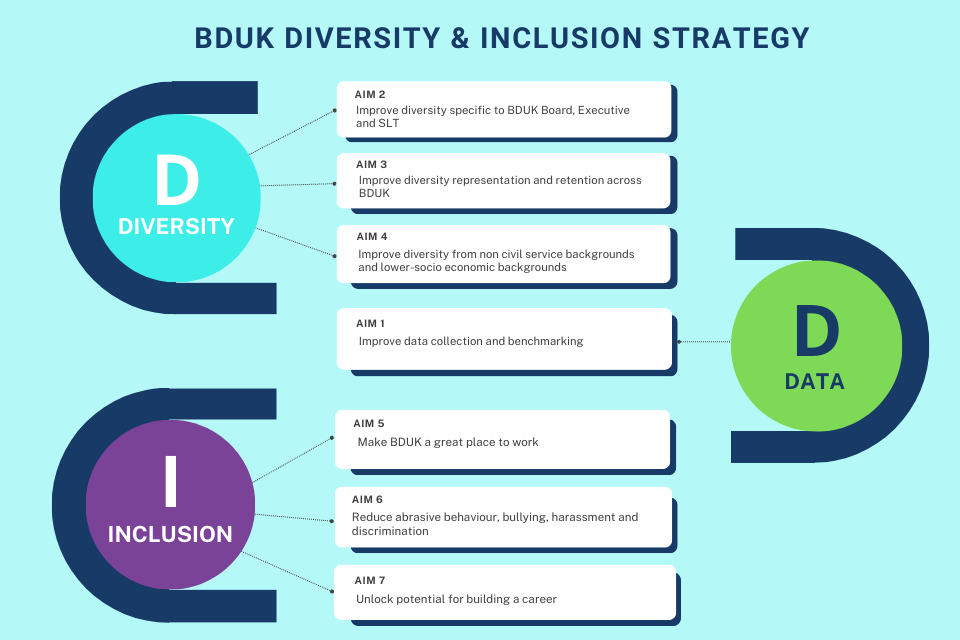
Data:
1. Improve data collection and benchmarking
Diversity:
2. Improve diversity specific to BDUK Board, Executive and Senior Leadership Team (SLT)
3. Improve diversity representation and retention across BDUK
4. Improve diversity from non civil service backgrounds and lower-socio economic backgrounds
Inclusion:
5. Make BDUK a great place to work
6. Reduce abrasive behaviour, bullying, harassment and discrimination
7. Unlock potential for building a career
We will implement this strategy in the year ahead, as part of our objective to strengthen our commitment to develop a positive culture, with clear values to support respect, diversity and inclusion.
8.2 Environmental sustainability and net zero
We are committed to protect the environment and enable sustainable practices, ensuring that environmental considerations are included in our programme delivery.
Net zero commitment with suppliers
There is a critical pass or fail element in the supplier selection process. The majority of our Project Gigabit procurement contracts[footnote 21] oblige our suppliers to confirm their commitment to reaching net zero by 2050 which aligns with the government’s Procurement Policy Note 06/21. [footnote 22] This note sets out how to take account of carbon in the procurement of major central government contracts. Suppliers do this by providing their carbon reduction plan and detailing their environmental measures being undertaken. Where the industry is striving to go further, we will support them with these ambitions. Wider environmental commitments from our suppliers also form part of the social value initiatives described in the ‘Social value’ section further below. In 2023, we contributed to the development of the Digital Connectivity Forum [footnote 23] guidance on net zero - the first telecoms industry-led guidance on net zero.[footnote 24]
We continue to assess where we can make improvements in the services and delivery within our programmes, and this will include the development of a BDUK sustainability strategy in the year ahead.
Our working practices
Our main offices are based in Manchester and London, and our geographically diverse workforce are further supported by offices including Belfast, Cardiff, Darlington and Edinburgh, as well as other smaller satellite locations. We support the Greening Government Commitments to reduce and improve the impact our operations have on the environment. [footnote 25]
Supporting our partners
In the Sustainable development report section of our Annual Report and Accounts 2022 to 2023, we identified initiatives to support our partners including; collaborating with Historic England to produce guidance to suppliers to give consideration of heritage assets, and working with National Parks England, Openreach and Trenches Law to develop a joint accord to create a standardised approach to the timely delivery of gigabit broadband with the 10 English National Parks. In August 2023, we also published an environmental resource guide to support the rollout of digital infrastructure in England.[footnote 26] The guide is based on England jurisdiction, but has direct relevance across devolved administrations too.
Benefits realisation
We have a standardised approach to evaluate our programmes, focussing on three main areas: process, impact and economic value.
In the past year we have published several reports evaluating the benefits of our programmes, including a Superfast State Aid evaluation report and BDUK Vouchers Evaluation: Impacts and Value for Money Assessment, these are accessible through our online Research Portal.
Findings from our Superfast State Aid evaluation report include increased employment in programme areas by 0.88%, leading to the creation of 6,261 local jobs by March 2021, and an estimated 23,700 local jobs from the programme as a whole.[footnote 27] Areas that received Superfast subsidies also saw an increase in the number of businesses, as well as increases to firms’ turnover, increased hourly earnings for workers and increased efficiency.
Our BDUK Vouchers Evaluation: Impacts and Value for Money Assessment showed a reduction in carbon emissions due to reductions in travel, with the median household reducing their travel by 50 miles per week.[footnote 28] There was also a reduction in energy usage in workplaces, with vouchers leading to a net reduction of 2,500 tonnes CO2e per annum.
We will continue to evidence the benefits achieved through gigabit connectivity from our interventions, particularly as more of our Gigabit contracts progress to the build phase. We will also develop our first Shared Rural Network evaluation for future publication.

8.3 Social value
We are committed to providing wider social benefits to communities from our programmes.
As part of the process for procuring contracts for Project Gigabit, we ensure that every contract we award delivers social value, and that benefits, such as tackling economic inequality and supporting wellbeing, are felt by people and communities across the nation. Project Gigabit has adopted the Cabinet Office Social Value Model[footnote 29] which aligns with the government’s Procurement Policy Note 06/20.[footnote 30] This note sets out how to take account of social value in the award of central government contracts by using the Social Value Model. In assessing suppliers’ bids for our contracts, 10% of the total score is assigned to social value.
Social value initiatives in action
Examples of initiatives from some of our awarded contracts include:
-
environmental sustainability and fighting climate change - a supplier is delivering an initiative to invest in local nature which includes planting at least one tree for every home passed by their build. In 2023 they planted over 60,000 trees and will continue with this as Project Gigabit build progresses
-
community wellbeing - a supplier set up a fund for the local area they have been contracted to deliver coverage to through Project Gigabit. By the end of 2023 over £50,000 worth of technology grants were allocated through this scheme to community groups and organisations, in order to provide access to digital technology for the most vulnerable
-
equal opportunities and tackling economic inequality - multiple suppliers have committed to deliver initiatives to create employment opportunities including work experience, apprenticeships and paid internships. One supplier has also committed to ensure that all customer facing and recruitment staff complete neurodiversity training
We monitor and measure the delivery of social value on a quarterly basis throughout the contract life cycle. Working directly with local councils, we review and assess the delivery of social value in line with the requirements of the awarded contract, ensuring that it is meeting the objectives and delivering the defined outcomes. Currently we are tracking social value delivery on 11 contracts and we will track further contracts as they progress to build stage in the coming year.[footnote 31]

8.4 Governance
Accountability for BDUK activities and decision-making rests with Dean Creamer, Chief Executive Officer and Senior Responsible Owner for BDUK’s programmes. BDUK is advised by its Board, which operates under the provisions of a Framework Agreement approved by the DCMS Permanent Secretary when DCMS was BDUK’s sponsor department.[footnote 32] We moved to a new sponsor department in February 2023 and we are working with DSIT to update the agreement.
BDUK’s board
Under the provisions of the Framework Agreement, the board has the following membership:
- a non-executive chair, who is responsible for leading the board and ensuring it effectively discharges its role: Simon P. Blagden CBE
- at least three non-executive directors (NEDs): Fiona Driscoll, Hazel Hobbs and Stephen Unger
- three BDUK Executives: Dean Creamer CBE, Chief Executive Officer; Martyn Taylor, Chief Commercial Officer; and Jonathan Clear, Chief Financial and Operating Officer
- at least one DSIT representative to provide a link between BDUK and the department: Sarah Connolly, Digital Infrastructure Director, DSIT
BDUK’s board is supported by the Audit and Risk Assurance Committee, and other subcommittees as it sees fit. This delivers robust oversight and additional assurance.
Executive boards
BDUK has a number of executive boards responsible for making decisions on programmes and the organisation, supported by a robust scheme of delegation.
- Project Gigabit Programme Board: Chaired by the Chief Executive Officer, this board provides oversight of work and makes decisions relating to the Project Gigabit programme
- Shared Rural Network Programme Board: Chaired by the Chief Executive Officer, this board provides oversight of work and makes decisions relating to the Shared Rural Network programme
- Executive Committee and Operational Boards: Chaired by members of the Executive and Senior Leadership, these boards provide oversight and decision making around BDUK operations and corporate services, including people issues, prioritisation of resources and organisation changes
Governance in detail: The Executive and Senior Leadership Team
BDUK is led by Dean Creamer. As its Chief Executive Officer and Senior Responsible Owner, Dean is supported by a Chief Commercial Officer and a Chief Financial and Operating Officer, collectively forming the BDUK Executive.
The Executive is supported by the wider Senior Leadership Team, including:
- the Project Gigabit Programme Director, responsible for the delivery of Project Gigabit
- the Shared Rural Network Programme Director, responsible for the delivery of the SRN programme
- the Director for Analysis, Evaluation and Strategy, responsible for BDUK’s strategy and analytics
- the Director for Finance and Human Resources, responsible for BDUK’s Human Resources and Finance functions
- the Director for Commercial, responsible for BDUK’s commercial activities, such as Gigabit contracts
- the Director for Digital, Data and Technology, responsible for designing and implementing BDUK’s technical solutions
- the Director for Vouchers, responsible for Project Gigabit’s voucher projects
- the Director for Risk, Compliance and Governance, responsible for designing and implementing BDUK’s governance, risk and assurance frameworks
- the Director for Engagement and Public Information, responsible for BDUK’s wider communications with stakeholders, Parliament and the public
Departmental sponsor
DSIT is our sponsor department. We also continue to build strong working relationships with other government departments. The primary contact with DSIT is through the DSIT Sponsor Team. The responsible Senior Civil Servant for this relationship is the Director General, Digital Technologies and Telecoms. DSIT is also represented on the BDUK Board by the Director, Digital Infrastructure, and on the Project Gigabit and Shared Rural Network Programme Boards by relevant officials. The Sponsor Team forms the main source of advice to the Responsible Minister and Principal Accounting Officer in their responsibilities overseeing BDUK’s overall governance.
-
ThinkBroadband, March 2024 ↩
-
‘One million premises upgraded to gigabit broadband by government’, published 22 February 2024. ↩
-
‘January 2024 performance reporting’, published 22 February 2024. ↩
-
‘Project Gigabit progress update April 2024’, published 10 April 2024. ↩
-
‘Metrics for the UK independent network sector’ report by INCA (Independent Networks Cooperative Association), May 2023. ↩
-
ThinkBroadband, March 2024. ↩
-
DSIT estimate from supplier reports, March 2024. Figures are based on total connections, not adjusted for unique connections. ‘Other’ group is not exhaustive and only includes altnets for which there is available data. ↩
-
‘Second National Infrastructure Assessment’, October 2023. ↩
-
Independent website ThinkBroadband has suggested that, based on previous months delivery, 85% of premises could be gigabit-capable before the end of 2024. ↩
-
Extended Area Service (EAS) is part of the Home Office’s Emergency Service Network (ESN) and will ensure coverage in the most rural and remote parts of the United Kingdom. The EAS masts built for ESN will be made available for other mobile operators to offer commercial mobile coverage under the Shared Rural Network programme. ↩
-
‘Ofcom - Connected Nations Report’, published 19 December 2023. ↩
-
Digital Mobile Spectrum Limited (DMSL), a joint venture of all four mobile operators, coordinates elements of the Shared Rural Network programme and provides reporting and tracking information for the four MNOs and DSIT. ↩
-
‘Supporting mobile connectivity’, published 22 February 2024. ↩
-
Ofcom’s licence obligations commit each individual operator to increase its 4G coverage to 88% of UK landmass by June 2024. ↩
-
Based on the current published pipeline, there may be further areas in which Gigabit contracts have not been currently identified as the most appropriate approach. ↩
-
From at least one mobile network operator. ↩
-
Total Not Spots are areas where there is currently no coverage from any mobile network operator. ↩
-
In line with Ofcom’s licence obligations and the Shared Rural Network grant agreement, mobile network operators will provide 1% geographic 4G coverage in Total Not Spot areas. ↩
-
Superfast Broadband is our legacy programme, now delivering gigabit-capable connectivity to premises that can currently only access speeds below 30 Mbps. ↩
-
Contracts with a net annual value of £5 million or more. ↩
-
‘Procurement Policy Note 06/21: Taking account of Carbon Reduction Plans in the procurement of major government contracts’, updated 9 January 2023. ↩
-
An expert telecoms advisory forum focused on digital connectivity. See www.connectivityuk.org. ↩
-
‘Digital Connectivity Forum - net zero guidance for SMEs’, published November 2023. ↩
-
‘Greening Government Commitments 2021 to 2025’, updated 15 December 2022. ↩
-
‘BDUK - environmental resource guide’, published 8 August 2023. ↩
-
‘Superfast Broadband Programme - State Aid evaluation report 2023’, published 4 September 2023. ↩
-
‘BDUK Vouchers Evaluation: Impacts and Value for Money Assessment’, published 20 September 2023. ↩
-
‘Procurement Policy Note 06/20 – taking account of social value in the award of central government contracts’, published 24 September 2020. ↩
-
Correct as at 28 March 2024. ↩
